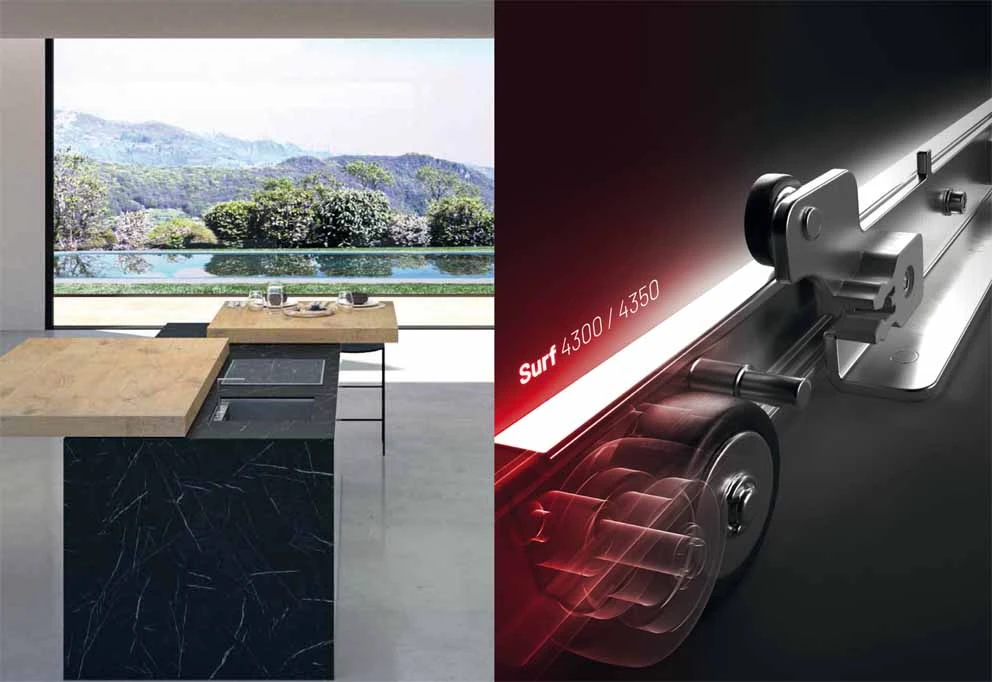
Index
Commitment and perseverance to achieve the set goals: these are the values at the heart of the innovation process that Omge, a company specialising in the production of telescopic drawer slides, furniture sliding systems and furniture components, has been undertaking for some years now with the intention of broadening its commercial horizons.
The knowledge and experience gained over many years of activity and collaboration with leading companies in the sector and its design capacity make it flexible and dynamic, ready to respond to the different market expectations, thus enabling product customisation.
Precisely about product customisation, corporate sustainability and the strategies for 2024, we talk to Luca Eustacchioni, CEO of Omge.
Start of the year, time to take stock and strategise for the future. What goals do you set yourself to tackle the markets in 2024?
The last few years, for reasons we all know by now, have led companies to change their business logic, forcing management to adopt and develop alternative strategies and procedures.
To set as a goal a return to a pre-pandemic situation is in my opinion, despite the fact that little time has passed, a somewhat anachronistic goal because, as I repeat, the commercial logics, and consequently the strategies that a company must put in place, are no longer the same.
The exit from the pandemic had created a certain enthusiasm in the markets which, in truth, during the past year for various reasons, not least the instability arising from geopolitical issues, has waned somewhat.
The resulting climate of uncertainty did not, however, affect our strategies, which for 2024 represent the continuation of what we started last year with the development and presentation of new products.

Swing 9322, mechanism with rototranslating movement
Further increasing the use of B2B to retain existing customers and developing a marketing plan more oriented towards the digital world are the tools with which the company intends to improve the brand and seek new customers in 2024.
Sustainability is now considered a great opportunity for companies. How is this concern for the environment expressed in your company?
I see that in recent times it is common practice to link the concept of sustainability to arguments that can only be attributed to environmental and social factors, forgetting what in my opinion is the most important factor for the sustainability of a company, namely the economic factor.
The sustainable company must be able to guarantee economic remuneration to its workers, in compliance with the laws in force, and to do so in a socially healthy and positive environment, with particular attention to environmental impact.
All this in the full conviction that sustainability is not a cost, but an investment with a clear return in terms of image and more.
In this regard, I must say that our company was a bit of a pioneer, having equipped itself with an extensive photovoltaic system when sustainability was not yet a recurring concept in the thoughts of the industrial world.
The code of ethics the company has adopted and the attention paid to suppliers' compliance with the rules help to define Omge SpA as a company that is particularly attentive to environmental issues.
Design and technological innovation were until now the winning elements for new products; to these is now added the customisation factor, which is also becoming increasingly important in the subcontracting sector for the furniture industry. How do you respond to this trend?
By its very nature, Omge SpA is a company well aware of how customisation, and I would add product customisation, plays a well-defined role in various sectors, including that of subcontracting for the furniture industry.

Surf 4300, sliding mechanism for kitchen worktops and tops
Addressing different industries, we are well aware of the importance of being able to guarantee both aesthetic and technical multi-functionality, and therefore we are certainly not unprepared for this need.
Today, the spasmodic quest to attract the customer's attention has extended the concept of customisation to the mass market as well. In fact, the old-fashioned mass market forces companies to submit to imposed rules that cannot always be accepted, so the possibility of being able to create and offer flexibility to customers is welcome.
In our case, I would say that we are particularly inclined towards the true customisation of a product precisely because of our propensity to target the industrial world.


 en
en  Italian
Italian French
French German
German Spanish
Spanish Portuguese
Portuguese








